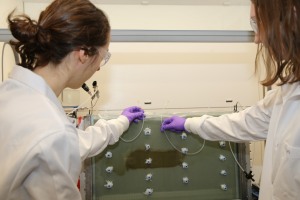The Sc.M. program in Environmental Engineering provides students with the tools to develop sustainable solutions to complicated environmental problems and design real-world solutions that consider risk, sustainability, life-cycle principles, and environmental impacts. Environmental engineers use the principles of engineering, mathematics, biology, and chemistry to develop and implement engineering solutions to protect human health and the environment from the adverse impacts of environmental pollution. Their work includes water and wastewater treatment, air pollution control, soil and groundwater remediation, site characterization and risk assessment, life cycle assessment, and climate change mitigation.
Within a few years of graduation, graduates of the Brown Environmental Engineering (EnvE) Program will: (1) Engage in continued learning through professional development, professional licensure, and service to the profession and society; (2) Achieve leadership positions or roles that advance environmental engineering practice; and (3) Pursue and successfully obtain an advanced graduate or professional degree in environmental engineering or a related discipline.
Students in the EnvE master’s program can study a broad range of topics including:
- Water and wastewater treatment
- Air pollution control
- Soil and groundwater remediation
- Site characterization and risk assessment
- Life cycle assessment
- Climate change mitigation
- Emerging contaminants
Program of study
MASTER OF SCIENCE – NON-THESIS OPTION
Students take a total of eight courses to satisfy the degree requirements. Students are expected to complete the Master of Science – Non-Thesis program option in three semesters, taking three courses in the first and second semesters, and two courses in the third semester.
MASTER OF SCIENCE – THESIS OPTION
Students take a total of eight courses, including independent reading and research courses. Students are expected to complete the Master of Science – Thesis program option in four semesters, taking three courses in the first semester, two in the second and third semesters, and one in the fourth semester. Students can switch between degree options during the program for greater flexibility. Students interested in pursuing the Thesis option usually identify a faculty advisor during their first or second semester at Brown.
MASTER OF SCIENCE – PROFESSIONAL OPTION
In addition to the course requirements, a paid or unpaid experiential learning experience of 3-6 months is a required component of the professional track program. Experiential learning can include a summer internship or completion of ENGN 2960 (Experiential Learning in Industry (ELI)) as an elective course. Assistance in obtaining internships will be provided by the School of Engineering and Career Services and Professional Development in the School of Professional Studies.
